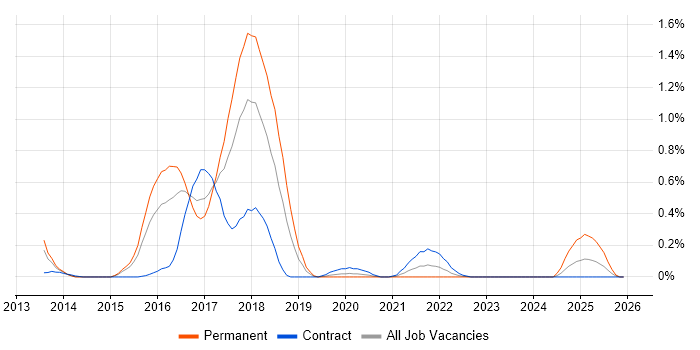Hadoop Distributed File System (HDFS)
Berkshire > Reading
The table below provides summary statistics for permanent job vacancies advertised in Reading requiring HDFS skills. It includes a benchmarking guide to the annual salaries offered in vacancies that cited HDFS over the 6 months leading up to 8 May 2025, comparing them to the same period in the previous two years.
| 6 months to 8 May 2025 |
Same period 2024 | Same period 2023 | |
|---|---|---|---|
| Rank | 64 | - | - |
| Rank change year-on-year | - | - | - |
| Permanent jobs citing HDFS | 2 | 0 | 0 |
| As % of all permanent jobs advertised in Reading | 0.39% | - | - |
| As % of the System Software category | 1.96% | - | - |
| Number of salaries quoted | 2 | 0 | 0 |
| 10th Percentile | £95,500 | - | - |
| 25th Percentile | £96,250 | - | - |
| Median annual salary (50th Percentile) | £105,000 | - | - |
| 75th Percentile | £116,250 | - | - |
| 90th Percentile | £118,500 | - | - |
| Berkshire median annual salary | £105,000 | - | - |
All System Software Skills
Reading
HDFS falls under the System Software category. For comparison with the information above, the following table provides summary statistics for all permanent job vacancies requiring system software skills in Reading.
| Permanent vacancies with a requirement for system software skills | 102 | 282 | 277 |
| As % of all permanent jobs advertised in Reading | 19.73% | 16.51% | 17.33% |
| Number of salaries quoted | 55 | 222 | 127 |
| 10th Percentile | £34,000 | £27,750 | £23,500 |
| 25th Percentile | £49,375 | £34,000 | £26,625 |
| Median annual salary (50th Percentile) | £67,500 | £52,550 | £50,000 |
| Median % change year-on-year | +28.45% | +5.10% | - |
| 75th Percentile | £83,750 | £59,000 | £74,000 |
| 90th Percentile | £112,500 | £81,000 | £83,750 |
| Berkshire median annual salary | £70,000 | £55,000 | £48,850 |
| % change year-on-year | +27.27% | +12.59% | -2.30% |
HDFS
Job Vacancy Trend in Reading
Job postings citing HDFS as a proportion of all IT jobs advertised in Reading.

HDFS
Salary Trend in Reading
3-month moving average salary quoted in jobs citing HDFS in Reading.
HDFS
Co-occurring Skills and Capabilities in Reading by Category
The follow tables expand on the table above by listing co-occurrences grouped by category. The same employment type, locality and period is covered with up to 20 co-occurrences shown in each of the following categories:
